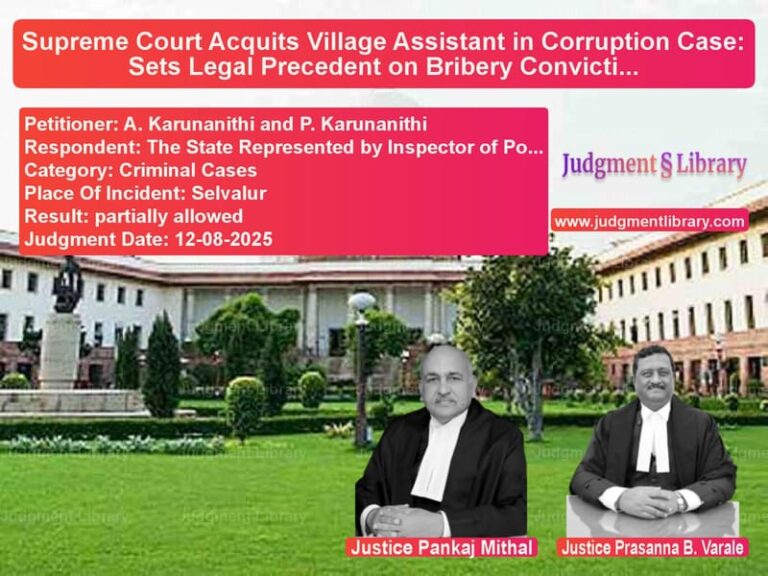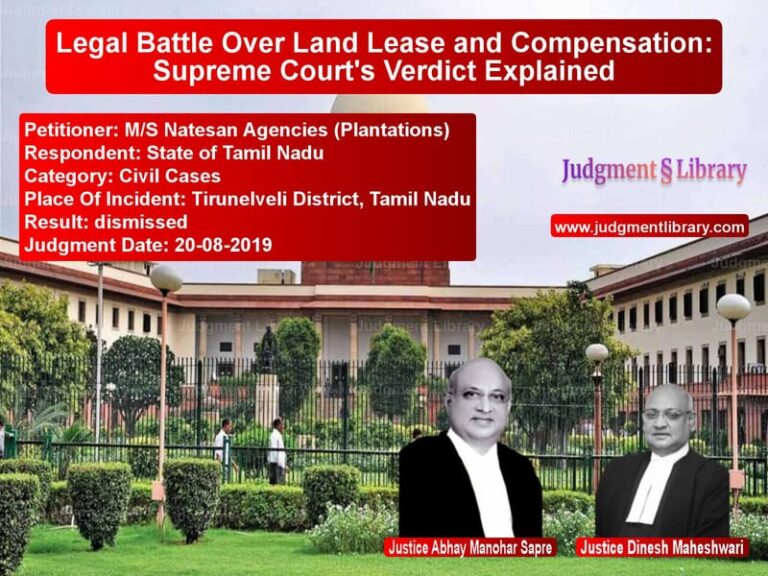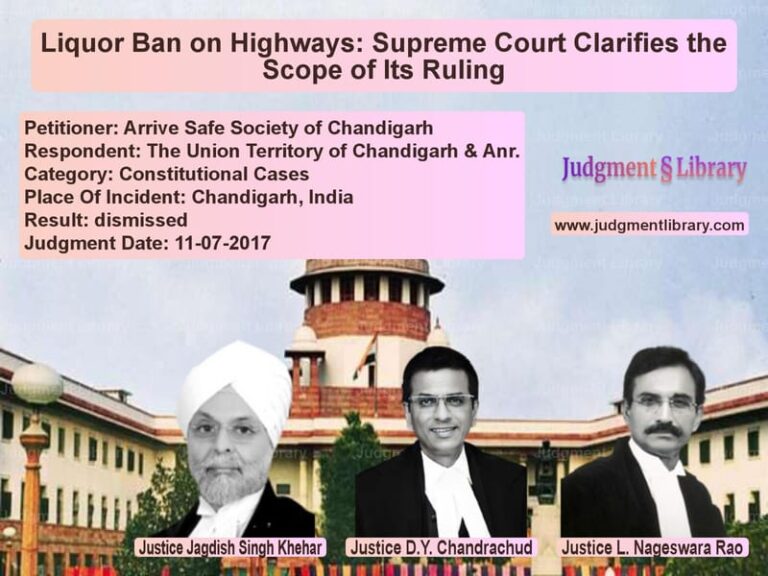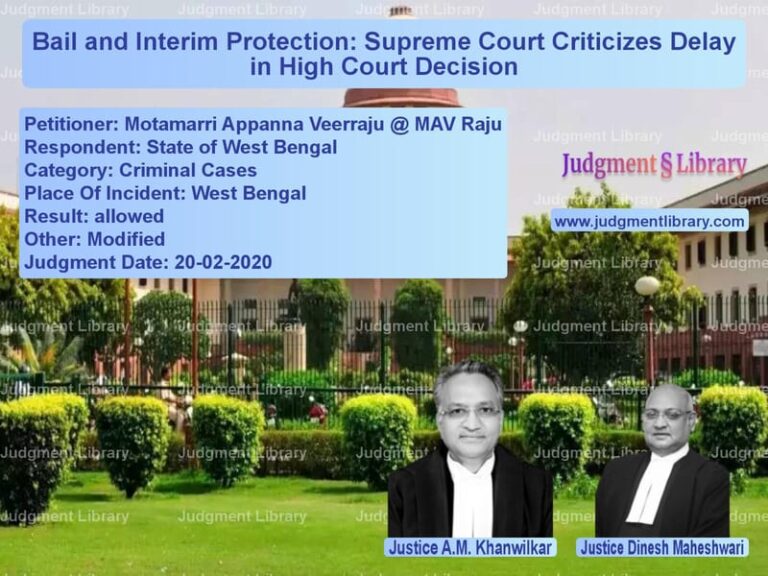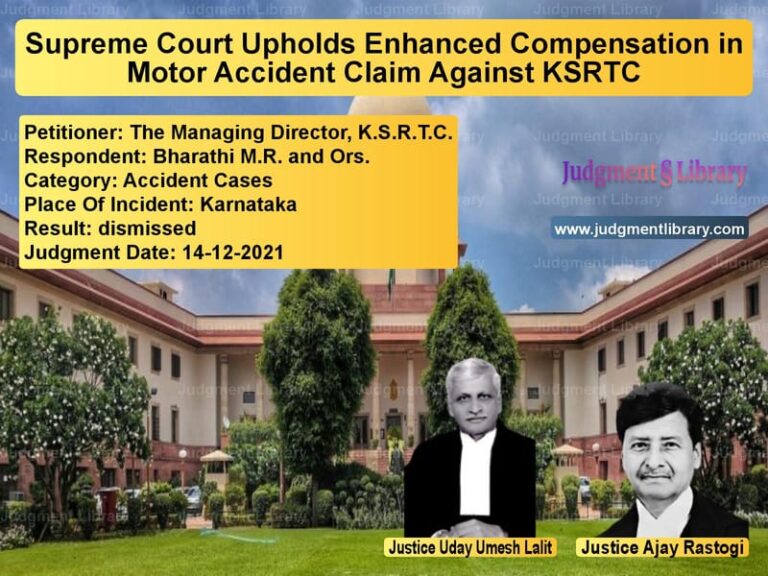Home Guards’ Entitlement to Pay Benefits: Supreme Court’s Verdict on Salary Parity
The case of Prakash Kumar Jena & Ors. v. The State of Odisha & Ors. revolves around the crucial issue of whether Home Guards in Odisha are entitled to salary benefits at par with police constables. The matter reached the Supreme Court after prolonged litigation between the Home Guards and the State of Odisha regarding the implementation of salary recommendations made by various authorities, including the Supreme Court in previous judgments.
The appellants, who were Home Guards serving in Odisha for over a decade, sought parity in pay with their counterparts in other states as per the directives of the Supreme Court in the case of Grah Rakshak, Home Guards Welfare Association v. State of Himachal Pradesh. Despite multiple directives from the government and judicial authorities, the State of Odisha failed to implement the recommended salary structure, leading to the present appeal.
Background of the Case
The appellants, serving as Home Guards under the Odisha government, had been working for over 10 to 15 years. They approached the High Court of Orissa, seeking salary disbursement per the Supreme Court’s ruling in Grah Rakshak. The High Court ruled in their favor, directing the State to implement salary recommendations.
The Home Guards contended that their duty structure was similar to that of police constables, and hence, they should receive equivalent remuneration. However, the State of Odisha challenged the High Court’s order, arguing that Home Guards were not entitled to salary benefits at par with regular police personnel.
Arguments by the Parties
Arguments by the Appellants
The appellants, represented by their legal counsel, put forth the following key arguments:
- The Supreme Court, in Grah Rakshak, had already ruled that Home Guards should be paid at the rate equivalent to police constables.
- The Director General of Police in Odisha had recommended Rs.533 per day as the minimum pay for Home Guards, based on the lowest rank of police constables.
- Several other states had already implemented the Supreme Court’s directive, providing Home Guards with the mandated pay scale.
- Despite clear directives, the State of Odisha failed to implement the salary recommendations, violating both the Supreme Court’s orders and fundamental rights of Home Guards.
- The Odisha government’s claim that implementing this directive would impose a financial burden was unjustified, as the Home Guards had already been performing duties equivalent to police constables.
Arguments by the Respondents
The State of Odisha, while defending its stance, argued:
- The directive to pay Rs.533 per day to Home Guards was excessive and financially unsustainable.
- The government had already complied with the Supreme Court’s ruling by increasing Home Guards’ pay from Rs.240 per day to Rs.300 per day.
- Unlike police constables, Home Guards were engaged on a need-basis and did not undergo permanent employment structures.
- Implementing the pay increase would create disparities between newly recruited police constables and Home Guards.
- There were over 16,894 Home Guards in Odisha, and implementing the directive would impose an additional burden of approximately Rs.189 crores annually.
Supreme Court’s Analysis and Findings
Precedent in the Grah Rakshak Case
The Supreme Court analyzed its own precedent set in Grah Rakshak, where it had ruled that Home Guards must receive minimum pay equivalent to police personnel. In its judgment, the Supreme Court had explicitly stated:
“The State Government should pay them the duty allowance at such rates, total of which in 30 days (a month) comes to the minimum of the pay to which the police personnel of the State are entitled.”
The Supreme Court noted that while the Odisha government had increased Home Guards’ salaries, it had failed to implement the recommended pay of Rs.533 per day, as per its own Director General’s recommendation.
Discrepancy in Pay Structure
The Court examined the argument that Home Guards should not receive pay equivalent to permanent police constables. It observed that Home Guards, though not permanent employees, were performing police duties under similar working conditions. As such, they should receive remuneration reflecting the nature of their work.
Implementation in Other States
The Supreme Court noted that several states, including Punjab, Madhya Pradesh, Bihar, and Maharashtra, had already implemented the recommended pay scale for Home Guards. Odisha remained one of the few states that had not complied.
Financial Burden Argument
The Court dismissed the State’s argument that implementing the salary directive would lead to a financial burden. It held that financial constraints could not justify the denial of fundamental rights, especially when other states had complied with similar directives.
Final Judgment by the Supreme Court
The Supreme Court ruled in favor of the Home Guards, affirming that they were entitled to Rs.533 per day as per the earlier directive. However, considering the financial implications, the Court modified the effective date of implementation.
The Court ruled:
- The Odisha government must pay Home Guards Rs.533 per day.
- The arrears would be calculated from June 1, 2018, rather than 2016 as originally sought.
- The arrears must be cleared within three months of the judgment.
- Periodic salary revisions must be implemented in line with future police salary hikes.
Impact of the Judgment
The judgment serves as a landmark ruling on pay parity for contractual workers performing equivalent duties to regular employees. It ensures that Home Guards, who serve as an essential part of law enforcement, are not subjected to unfair pay practices.
The ruling also sets a precedent for other states that have not yet implemented salary parity for Home Guards. It reinforces the principle that financial constraints cannot override constitutional and legal obligations.
Conclusion
The Supreme Court’s judgment in Prakash Kumar Jena & Ors. v. The State of Odisha & Ors. reiterates that contractual workers performing essential duties must receive fair compensation. The ruling not only benefits Home Guards in Odisha but also serves as a guiding framework for wage policies across India.
Petitioner Name: Prakash Kumar Jena & Ors..Respondent Name: The State of Odisha & Ors..Judgment By: Justice M. R. Shah, Justice M. M. Sundresh.Place Of Incident: Odisha.Judgment Date: 16-03-2023.
Don’t miss out on the full details! Download the complete judgment in PDF format below and gain valuable insights instantly!
Download Judgment: prakash-kumar-jena-&-vs-the-state-of-odisha-supreme-court-of-india-judgment-dated-16-03-2023.pdf
Directly Download Judgment: Directly download this Judgment
See all petitions in Public Sector Employees
See all petitions in Employment Disputes
See all petitions in Judgment by Mukeshkumar Rasikbhai Shah
See all petitions in Judgment by M.M. Sundresh
See all petitions in partially allowed
See all petitions in Modified
See all petitions in supreme court of India judgments March 2023
See all petitions in 2023 judgments
See all posts in Service Matters Category
See all allowed petitions in Service Matters Category
See all Dismissed petitions in Service Matters Category
See all partially allowed petitions in Service Matters Category


